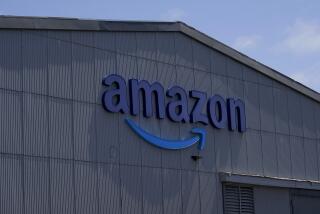Car Shopping on the Info Superhighway
- Share via
Time was, there were two ways to shop for a car.
One involved a Magic Marker and the classified ads. The other, cruising auto malls in search of the right dealership.
Both could take big chunks of time.
Today, however, consumers can buy a car without even having to kick the tires, except with a mouse.
Scores of services have sprung up in the past two years using computerized methods for selling cars, often locating specific cars and providing on-screen pictures of the auto, with a list of its specifications and features.
This chooser-friendly technology can be accessed via phone or personal computer and includes the Internet, self-service kiosks and 1-800 numbers.
It’s a “new kind of power--the power of choice--which rests with both the retailer and the consumer,” a recent report by the Calabasas-based auto marketing firm J.D. Power and Associates stated.
These innovations, said J.D. Power partner Donald L. Keithley, “have the potential to revolutionize the industry.”
Not to be left behind, scores of firms--from computer companies to auto dealers--are rushing to get a piece of the action.
The Internet
“There are literally hundreds of sites on the Internet that allow access to pricing, financing and inventory,” according to Mark Sims, president of Netrex, a World Wide Web page developer.
The services vary widely. Some, such as Edmond’s Automobile Buyer’s Guide, offer free buyer advice, safety information, access to car reviews and comparisons between dealer and list prices.
Others, such as IntelliChoice, a company based in Campbell, Calif., charge for reports on invoice pricing, rebates and evaluations of ownership costs, such as theft risk and insurance.
Then there’s Microsoft.
Last month, the Redmond, Wash., software giant got into the car-selling business in a big way, launching CarPoint in conjunction with other industry players such as IntelliChoice and Auto-By-Tel of Corona del Mar.
The one-stop shopping service gives car buyers the ability to take a simulated test drive, receive background information and, through Auto-By-Tel, submit a purchase request to a nationwide network of dealers and haggle over the final deal from a home computer.
Self-Service Kiosks
For consumers who cannot access the Internet from home, there are dealer-based touch-screen computer systems.
The system works by scanning the coding of the dealer’s car inventory into a computer system in much the same way store clerks sweep groceries over infrared scanners.
Dealers then have accurate, readily accessible data on the cars they have in stock. Buyers can access the information instantaneously, asking the computer for cars of a certain type, price or other characteristic.
Players in this emerging field include CarLink, a San Francisco firm that operates kiosks in credit unions, and OmniTouch, a Connecticut company that after the end of the Cold War converted defense-related technology into its interactive CarFinder system.
1-800 Numbers
Like computers and kiosks, 1-800 numbers allow buyers to tailor a request to their needs. Toll-free calling allows consumers to get information on used cars. Or, if they are looking to sell, place an ad detailing their car that is entered into a large database.
Callers describe what they are looking for and operators punch in the specifications, call up options and provide the phone numbers of the sellers, who pay a fee to be listed.
The biggies include 1-800 CarSearch and 1-800 LIST.
With all the emerging technologies, the important thing to the consumer is the size of a database, says John Rettie, an analyst for J.D. Power. “The bigger the better, so there’s choice for the consumer. It would not have worked in the past without computers.”
The technology, Keithley adds, is only as credible as the “accuracy of the information and the ability of the companies to follow through.”
But, he says, the changes will lure individuals who shy away from technology if for no other reason than they are practical time-saving devices. “In a consumer-driven market, the customer will have the last word.”
The changes fit with the “theme in America today,” said OmniTouch President Bill Yalen. “People want convenience and don’t want to hassle.”






